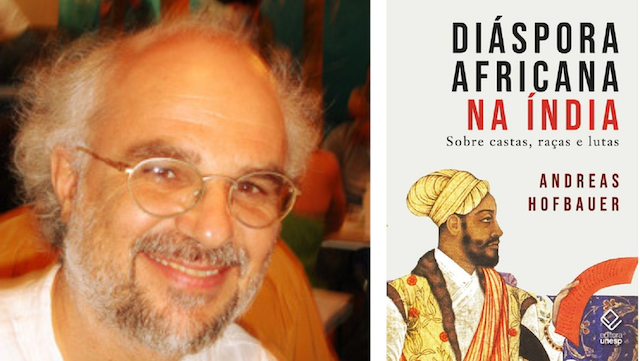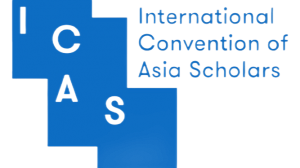Anime complejo proposes a contribution to anime studies based on the analysis of audiovisual narrative. Its author, Loriguillo-López, defines as “complex anime” the animation products that in recent decades have challenged the classic narrative, structured around linearity, causality and concordance. The author demonstrates, through multiple examples and using textual analysis tools, the existence of a new artistic experimentation within the cultural industries, which uses elements of art and essays, but also video games and the media mix.
Initiatives
Explore the books honored with the 2023 SEPHIS-ICAS Book Prize in the Spanish/Portuguese Edition
Andreas Hofbauer and Carles Brasó Broggi have respectively won the Portuguese and Spanish Editions of the Prize.
The winners were chosen from a pool of 41 candidates across both languages, recognized for their outstanding contributions to scholarship on Asia. We extend our gratitude to our esteemed reading committee, comprised of Andréa Doré (Federal University of Paraná, Brazil), and Marcos Pablo Centeno Martin (University of Valencia, Spain), for their dedicated involvement in this initiative. The awarded books are:
Spanish Edition

Broggi, Carles Brasó. 2022. Los médicos errantes: De las Brigadas Internacionales y la revolución china a la guerra fría. Barcelona: Crítica.
Los Médicos Errantes is an original study of 19 health professionals from Central Europe, mostly Communists and Jews, although cosmopolitan and polyglot in identity, who shared their experiences in the Spanish Civil War, in China’s (and Burma’s) war against the Japanese Empire. The book is the result of a solid ten-year research, in which Barsó Broggi offers a new vision of the relations between Spain and Asia at that time, expanding what was published by Rodao (Franco y el Imperio Japones, 2013) and Hwei- Ru and Len Tsou (Los brigadistas chinos en la Guerra Civil, 2013), bringing to light unknown aspects of the International Brigades in Spain and the War of Resistance in China. The book tells history from below, focusing on the medical service rather than military elites, offering an innovative perspective that connects national histories that are considered distant to global history.
Portuguese Edition

Hofbauer, Andreas. 2021. Diáspora africana na Índia: Sobre castas, raças e lutas. African Diaspora in India: On Caste, Race and Struggle. São Paulo: UNESP.
In Diáspora africana na Índia, Andreas Hofbauer examines processes of inclusion, exclusion, hybridization, inequality, and differentiation involving Afro-descendant populations in India, referred to as siddis or sidis. Hofbauer presents an original methodological proposal through the notion of difference as a metacategory in which race, culture, or identity can be ways of conceiving and expressing human difference. The book is the result of extensive documentary research to reconstruct the historical relations that led to the presence of Africans in India and field research with contemporary Siddi communities.
Watch here the Award Announcement and the interviews with Andreas Hofbauer and Carles Brasó Broggi.
Five books have been granted special accolades:
Best Organized Volume
Sosa, Jesús. 2022. La indústria farmacêutica en India: globalización, competência y financiarización [The Pharmaceutical Industry in India: Globalization, Competitiveness and Financing]. Ciudad de Mexico: Universidad Nacional Autónoma de México.
One of the most important economic sectors in India, the pharmaceutical industry, is the subject of Jesús Sosa’s work, which emphasizes its performance in the field of finance. More than its management or its institutions, it is the role that these companies play in globalization and financialization in India that is at stake. The author offers statistical surveys on different aspects of the industry, mainly concentrated between the years 1990 and 2017, which serve as material for acute analyses of the sector.
Promoting of Asian Studies
Moura, Rafael. 2021. Industrialização, Desenvolvimento e Emparelhamento Tecnológico no Leste Asiático: os casos de Japão, Taiwan, Coreia do Sul e China [Industrialisation, Development and Technological Leveling off in East Asia: The cases of Japan, Taiwan, South Korea and China]. Rio de Janeiro: INCT and Ideia D.
Rafael Moura’s book is a comprehensive study that takes a comparative approach to the historical processes of industrialization and technological development in four East Asian countries: Japan, China, South Korea, and Taiwan. The approach adopted dialogues with different theoretical perspectives and is dedicated to the analysis of institutional and macrostructural aspects of the economies of these countries. Government policies and business strategies are dissected in this exhaustive work.
Lesser Researched Areas
El Yattioui, Mohamed & Barona, Claudia (eds). 2021. Asia Central: Análisis geopolítico de una región clave [Central Asia: Geopolitical Analysis of a Key Region]. Cuidad de Mexico: Colección Universitaria de Estudios sobre Asia y África and Universidad Nacional Autónoma de México.
This collective work focuses on a geographical space – and one of great geopolitical relevance – that is less studied compared to other Asian contexts. The ten chapters that make up the book deal with different topics related to Central Asia. The authors make use of recent empirical data, and in some chapters there is a debate with works published in the languages of the region. The chapters make available to the public topics such as expressions of nationalism in the countries of the region; the exploration of rare earths; Central Asia as a nuclear non-proliferation zone; the U.S. presence in the region; Turkey’s relations with the countries of Central Asia; relations between Russia and China; Iran’s place in the geopolitics of the region; and the presence and strengthening of Islam from the late Soviet period to more recent political radicalism.
Educational Book for Readers in Spanish-Portuguese Language
Rojo, Gabriel Terol. 2022. Filosofía, intelectualidad y sinidad [Philosophy, Scholarship and Sinology]. Barcelona: Edicions Bellaterra.
Filosofía, intelectualidad y sinidad is a panoramic and accessible study of Chinese thought, or philosophy, both inside and outside East Asia. Gabriel Terol Rojo uses sources and bibliographies in Western languages and Chinese to develop aspects surrounding Chinese philosophy, such as intellectuality and its relationship with religion and the study of philosophy in Spanish academia. Constitutive aspects of the same philosophy are also addressed, with the presentation of the main concepts and authors of the Confucian, Daoist and Buddhist traditions.
Book on Asian Film, Media and Communication Sciences
Loriguillo, Antonio. 2021. Anime complejo. La ambigüedad narrativa en la animación japones [Complex Anime: Narrative Ambiguity in Japanese Animation]. Valencia: Aldea Global.
IBP 2023 Portuguese/Spanish Language Shortlist
Maya-Ambía, Carlos. 2021. Japón: El cansancio de una nación [Japan: The Fatigue of a Nation]. Ciudad de Mexico: Universidad Nacional Autónoma de México.
In Japón, El cansancio de una nación, Maya-Ambía offers a critical analysis of contemporary Japanese society from an original perspective, using the South Korean philosopher Byung-Chul’s idea of “burnout” as a guide. The book is an antithesis to idealized views of Japanese society, proposing a journey through some of its darkest aspects. Maya-Ambía uses burnout to explain phenomena such as hihikomori, or voluntary isolation, which she interprets as the burnout of dealing with others; karoshi, or death from work exhaustion, caused by excessive working hours; the increase in suicides, especially among children and adolescents tired of academic demands and bullying; or the otaku phenomenon, which consumes a fantasy as a consequence of real-world tiredness. Finally, she analyzes the term in relation to the gender roles imposed on men and women, with the ideas of the salaryman and the traditional wife-mother.
Ribeiro, Claudia. 2021. Uma escrita celeste: Distância lexical e imanência de significado no Tianshu (Livro do Ceu), de Xu Bing [Lexical Distance and Immanence of Meaning in Tianshu]. Macau: Instituto Internacional de Macau.
Based on works produced in China and texts by Western critics, Claudia Ribeiro approaches Xu Bing’s trajectory in Uma escrita celeste, focusing on the conditions of production of the work Tianshu (Libro del Cielo) in China in the 1980s, influenced by the opening and translation of Western works that began to be read. After an extensive review of the criticism of the work, the author presents her own interpretation of it, combining an aesthetic and historical analysis of Xu Bing’s work. Through short chapters with a pleasant and clear writing, the book presents a rigorous analysis and concerns the reader with the complexity of a concrete production of Chinese culture.
Tzili-Apango, Eduardo & Jiménez, José Antonio Cervera (eds.). 2022. Centenario del Partido Comunista Chino: Ensayos en honor a Romer Cornejo [Centenary of the Chinese Communist Party: Essays in Honor of Romer Cornejo. Cuidad de Mexico: El Colegio de México and Centro de Estudios de Asia y África.
This book, edited by Cervera Jiménez, takes as its guiding principle the multidisciplinary analysis of the Chinese Communist Party (CCP), one of the most important political actors in the world. This collective work presents a key contextualization for understanding the functioning of the Asian giant, examining a variety of topics such as: the evolution of the CCP and its contradictions throughout history, cyberpolitics and digital control, the emergence of the business class and the country’s adaptation to globalization, and the difficult role of women in the political scene. The final chapters examine foreign policy, from historical relations with Western powers, Hong Kong, mobilization during the Korean War, and exchanges with South America, to contemporary policies, including the crystallization of “soft power,” international action through its International Liaison Department, the diaspora, and relations with Southeast Asia.
Beja, Flora Botton; Cervera, José Antonio & Chen, Yong. 2021. Historia mínima del confucianismo [Brief History of Confucianism], Ciudad de Mexico: El Colegio de México.
Historia mínima del Confucianismo is a work by three authors – Flora Botton Beja, José Antonio Cervera and Yong Che – who present the evolution of Confucianism throughout history to a non-specialist audience. The authors provide the keys to understanding an aspect that has been fundamental not only to Chinese civilization, but also to other East Asian societies. The book is clearly organized into three blocks. First, Botton Beja provides an up-to-date overview of the best-known writers on Confucianism in the classical period. Second, Cervera proposes, for the first time in Spanish, a synthesis of the lesser-known authors of neo-Confucianism in the Song and Ming dynasties that emerged in response to the introduction of Buddhism in China, including their interactions with European Jesuits. Third, Yong Chen contextualizes the contemporary revival of Confucianism, drawing primarily on original Chinese sources.
Organising Committe
Secretary: Claudio Pinheiro
Reading Committee Members: Andréa Doré and Marcos Pablo Centeno Martin
Sponsor of the IBP 2023 Portuguese/Spanish Language Edition: Casa Asia
Partner

Sponsor

